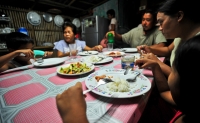India’s great nationalist leader Mahatma Gandhi coined the term satyagraha as a philosophy of non-violent political struggle in 1906, while he was engaged in the early anti-apartheid movement in South Africa. His political philosophy, refined over subsequent years as he returned to India to lead its struggle against British imperialism, had far-reaching impacts. Gandhi’s philosophy helped to fuel independence struggles not only in South Africa, but in India, a host of other post-colonial countries, as well as the African-American civil rights movement in the United States. Read More
Urbanizing China-EU Relations?
The European Union (EU) has long been one of the leading international actors in recognizing the potential of cities as agents of global governance. Fostering a variety of initiatives through the Committee of Regions, which acts as the EU’s assembly of regional and local representatives, Europe has promoted the participation of cities in regional and international governance since its early days. Read More
The Hard and Soft of Cultural Diplomacy: Networks and Stories in Global Affairs
Amy Zalman recently proposed that “soft power” – as a conceptual frame for understanding global politics – is too narrow and has outlived its usefulness. Her provocation generated fruitful responses and suggests that we might be ready to stop treading water and move beyond our decade-long fixation with the term to new and more constructive places. Read More
The Morsi Visit and New Guideposts for U.S. Public Diplomacy
Egypt’s president, Mohamed Morsi, is visiting the United States for the first time since taking office, and in an interview with the New York Times shortly before departing Cairo, he provided insights not only about his style of leadership but also about how Egypt has changed since the 2011 revolution that marked the end of Hosni Mubarak’s lengthy rule. Read More
Setting the Table for Diplomacy
In the latest instance of flag following fork, the U.S. State Department launched a new culinary diplomacy program, entitled "Diplomatic Culinary Partnership: Setting the Table for Diplomacy” The new Diplomatic Culinary Partnership initiative was unveiled on September 7, 2012 at the penthouse of the State Department, and this gastrodiplomat was on hand for the lovely soiree. Read More
Diplomatic Security: Tweeting the Public Diplomacy Gospel
APDS Blogger: Marissa Cruz-Enriquez Read More
Culture Posts: Giving Voice to Publics
Last week, before the world caught on fire over a film clip, I wrote about the paradox of value promotion in public diplomacy. No matter how appealing promoting one’s values may be, trying to do so in a global arena is fraught with difficulty. Yet, because values are integral to a nation’s communication, public diplomacy will inevitably reflect those values. What’s happening between the U.S. Read More
Syria: The Fall of the House of Assad
500 Days: Secrets and Lies in the Terror Wars
The Challenges of YouTube Diplomacy
Ten years ago, the Innocence of Muslims controversy would not have happened. YouTube did not exist, and without this means of reaching a global audience the offensive snippets of the “film” would never have been seen. Read More








